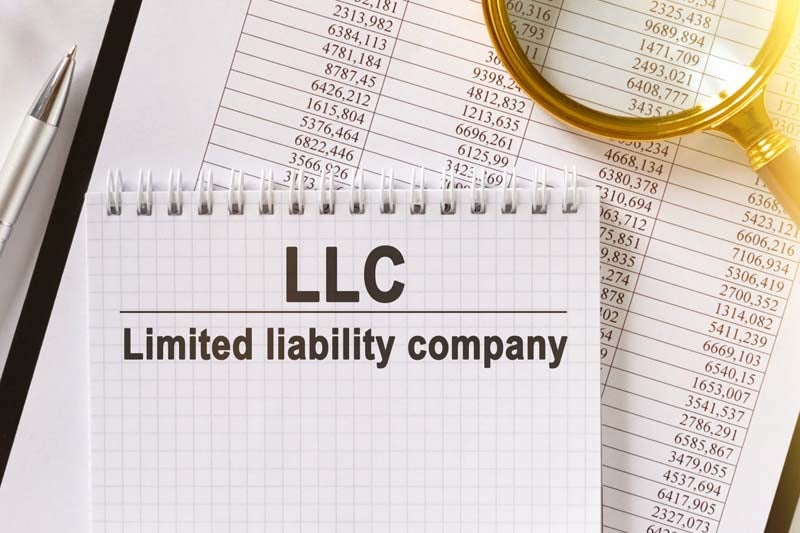Owning a limited liability company (LLC) comes with plenty of perks. You have autonomy over your business operations, receive certain tax benefits, and – in some cases – you can even borrow money from your LLC.
Before you start using your LLC as an extra cash reservoir, it’s important to understand the legal requirements and restrictions surrounding this type of transaction. You’ll also want to take precautionary measures to avoid breaking third-party agreements and limit tax consequences.
So… Can I borrow money from my LLC? The answer is yes! As a member of an LLC, you’re able to borrow money from it. However, if the LLC has other members, you’ll have to get their approval before you can move forward with the loan.
Use this guide as a starting point for everything you need to know about borrowing money from your LLC.

Overview of an LLC
A limited liability company (LLC) is a type of business that offers liability protection for the owner(s) and certain tax advantages. The structure separates the owner’s personal assets from the business’s debts and legal liabilities.
The business can have one or multiple owners, all of whom are free to structure their operations as they please. LLCs can have a board of leaders who all have an equal stake in the decision-making or one leader that’s advised by the other part-owners. In either case, the owners must register their business with the appropriate state agency and extend their operating agreement whenever the “limited life” of the business expires.
Tax Implications for LLC Loans
If you’re not careful, the IRS will treat your loan as a dividend or distribution and require you to pay taxes on it. This can happen if you don’t document the loan properly or if you don’t follow the required procedures.
You might also be taxed if the amount you borrow exceeds your annual contribution to the LLC or if the loan is canceled. In some cases, paying the loan off in full at the year’s end and immediately renewing it in the new year will also result in taxes.
To avoid possible tax implications, it’s important to document the loan as a legally enforceable promissory note. Make sure to include specifics such as the loan amount, repayment schedule, interest rates, and whether collateral was used. There should also be minutes recorded expressing the loan’s authorization with signatures from every LLC member. Make sure the loan is shown on all of the LLC’s corporate books, records, and financial statements.
Finally, the interest rate should be at the federal rate at the very minimum. On top of tax implications, be aware of any third-party violations and possible conflicts with shareholders. Violating corporate agreements can result in additional taxes or even fines.
Can You Borrow Money From Your LLC?
Yes, but you’ll need to get written approval from the other members of your LLC. The members must also create and legalize a contract outlining the amount of debt, repayment schedule, and repercussions of a default during the LLC’s minutes.
Borrowing from your LLC can come with tax stipulations, so it’s recommended that you speak with your financial advisor before going forward. They’ll be able to provide more information about the benefits and drawbacks of your specific situation.
Are There Any Risks and Considerations?
Yes, but a majority of them surround taxation. You have to make sure that the funds don’t appear as a taxable distribution on your financial statements. Otherwise, you run the risk of raising your tax liability.
If the loan is canceled for any reason, the funds are considered a taxable gain and must be reported as such. You must also be careful not to borrow more money than you’ve put in because this is also considered a taxable gain.
For the best results, you’ll need to ensure that you’re able to sustain the loan throughout the term and avoid the funds falling under a taxable distribution and affecting your tax return. You should also plan out the move as best you can and make sure everything is documented.
Is It Right to Borrow from Your LLC?
You’re able to borrow from your LLC, but it does open up a risk of more intensive taxation. If possible, it’s recommended to seek out alternative funding sources outside of your business to ensure you’re making the most advantageous move.
The Internal Revenue Service (IRS) can recharacterize the transaction as an advance and not a loan, which has numerous tax implications. To avoid this, it must be treated and documented as a “loan,” meaning that the transaction must begin with the intention of repayment.
It’s complicated, and a lot of the risk comes from not knowing how the IRS will respond to your transaction. You need to talk to your financial advisor before you do this or consider other financing options to reach your end goal.
Alternatives to Borrowing Money From Your LLC
If you don’t want to deal with the risks, here are a few alternatives you can leverage.
- Personal funds
- Crowdsourcing
- Payday loans
- Asking for an advance on a paycheck
- Family and friends
- Selling assets
The difficulty of each option depends on the amount you need. If you need a significant amount, it’s helpful to speak with your financial advisor to go over your options. They’ll have a deeper understanding of the laws and regulations that affect your specific situation, which will make it much easier to understand which path is best for you.
The Bottom Line
If you’re planning on borrowing money from your LLC, make sure the transaction is properly documented. It can also help to consult with an accountant or legal expert to avoid possible mistakes or confusion.
While borrowing money from your LLC can help you obtain financing, there are other safer, easier ways to get an influx of cash. Borrowing money from your business can drain your available resources. You may even run into difficulties or have to forgo opportunities if you don’t have enough working capital available.
A small business loan or a business line of credit can relieve these problems. A small business loan or a business line of credit are flexible solutions that offer a burst of liquidity you can use to cover a large range of expenses. You can invest in your business, mitigate cash flow disruptions, expand operations, and much more.
At National Business Capital, we help small businesses secure financing that works for them. We have exclusive lender relationships with top U.S. B2B lenders, many of which feature relaxed requirements you won’t find from a traditional lender. Plus, we work to get you the funding you need fast. While traditional lenders take weeks or months to approve your application, our entire process works in hours.
Ready to learn more? Fill out our 60-second application and learn about financing you can qualify for.
Related Business Articles:
- Can I Get a PPP Loan and A Small Business Loan?
- 4 Business Loans For Retailers (And How to Get One)
- 6 Factors That Keep You From Getting a Small Business Loan
- Small Business Loans 101
- How to get a Small Business Loan in 5 Steps
- 7 Minority Grants for Small Businesses
Disclaimer: The information and insights in this article are provided for informational purposes only, and do not constitute financial, legal, tax, business or personal advice from National Business Capital and the author. Do not rely on this information as advice and please consult with your financial advisor, accountant and/or attorney before making any decisions. If you rely solely on this information it is at your own risk. The information is true and accurate to the best of our knowledge, but there may be errors, omissions, or mistakes.

Joe Camberato
Joe Camberato is the CEO and Founder of National Business Capital. Beginning in 2007 out of a spare bedroom, Joe and his team have financed $2+ billion through more than 27,000 transactions for businesses nationwide. He’s made it his calling to deliver the educational and financial resources businesses need to thrive.
Accelerate Your Success
Seize the opportunity to grow your business and gain access to the capital you need.





